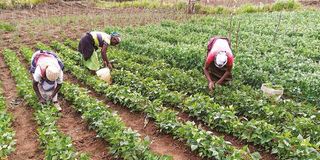Kenyan women deserve more credit for their role in agriculture

Women pick French beans at Kairigire village, Laikipia North, March 2022.
What you need to know:
- Seventy per cent of Kenyans, mostly women, make money from farming. They sow, cook, tend, and exchange food.
- Empower farm women with easier access to credit and resources tailored to their education levels.
- Empower farm women with credit, inputs, and marketing through women's cooperatives and government programmes.
Kenyan women farmers rock in agriculture and related sectors like livestock, post-harvest, horticulture, fishery, forestry, and sericulture! Backed by studies. Women farmers toil to cultivate and prepare food. Empower rural women for equality and food security.
Women farmers are key to growing enough food. Equal opportunities for women equal better food security. Solving this goal is tricky, but with a thorough approach, it's doable.
Farming opens doors for personal growth and success. Land and machinery access is limited. They're busy at home, doing important things that affect the economy but often go unnoticed.
Empowering women is key to food security. Extension and advisory services empower individuals. Empowering women is key to securing a better future for all. Empower women's land rights! Women dominate agriculture but lack resource control.
Women make up 43 per cent of the world's agricultural workforce. Seventy per cent of Kenyans, mostly women, make money from farming. They sow, cook, tend, and exchange food. Farm women: labour, chores, childcare.
Gender norms limit women's potential. Gender inequality hampers women's opportunities in finance, markets, and education. Men control the cash, making all the spending decisions.
Kenyan women rule the food scene. Women do most of the farming, about 70–80 per cent. Agricultural extension helps farmers with government and non-government support.
They need to help farmers improve their knowledge, attitude, and skills through training and advice. They also need to support them in making decisions based on new research. Farmers and farm women are both included in these programmes and efforts.
Also read: Rural women, a nation’s powerful force
Programme managers often overlook women's important role in agriculture, assuming they are only farmer's wives. This marginalises and underestimates their contributions. Kenya's agricultural extension service neglects female farmers, failing to address their invisibility.
Studying farmers' empowerment in Kenya using Tobit and Logit models with 835 participants. Just 11 per cent of farmers were empowered, with only five per cent being female. Gender's impact on agricultural empowerment benefits male and female farmers in unique ways.
Women farmers are often overlooked by male extension workers. Kenyan women farmers deserve more recognition for their contribution to agriculture, but they haven't received enough extension services.
Revamp Kenya's extension services to better connect with farm women. To achieve sustainable rural development, they must help farm women access and improve extension services. This will empower them with technology.
Programmes focused on home economics neglected women's contributions to agriculture. Kenyan women dominate agricultural work. Customary laws limit women's contribution to agriculture. Women's agricultural role is undermined.
They've overlooked women in agriculture. In Kenya, women farmers benefit very little from major extension systems. Empower farm women with proper support and guidance.
Farm women in Kenya lack access to extension services.
Factors hindering farm women's engagement include limited access to extension centres, communication barriers, low income for purchasing inputs, land scarcity, inconvenient meeting times and locations, gender bias from extension staff, a lack of gender-appropriate technology, and a lack of authority.
Also read: Empower rural women to boost food security
Low farm women's literacy, a lack of innovation, fewer women in extension services, and a lack of structural support for women farmers were additional factors. Kenyan women, crucial in agriculture, lack property rights, excluding them from inheritance.
They're the biggest bunch of landless workers. Revamp Kenya's extension machinery for better results. Attitude change is needed towards women in professions.
To empower farm women, they must educate extension workers, managers, administrators, and policymakers about their needs. This will help them contribute equally to agricultural and rural development alongside men. Empowering farm women with timely advisories and extensions.
Extension workers and managers must change their attitudes to improve women's access to agricultural extension in Kenya.
In Kenya, where most functionaries are men, gender training can help change attitudes. Improve women's access to extension services by changing Kenya's extension system.
Empower farm women with easier access to credit and resources tailored to their education levels. Empower farm women with credit, inputs, and marketing through women's cooperatives and government programmes.
They must hire more extension workers for agricultural extension at all levels. Institutional changes are needed for progress in the extension system.
The writer is a veteran journalist and freelancer based in Brampton, Canada.





